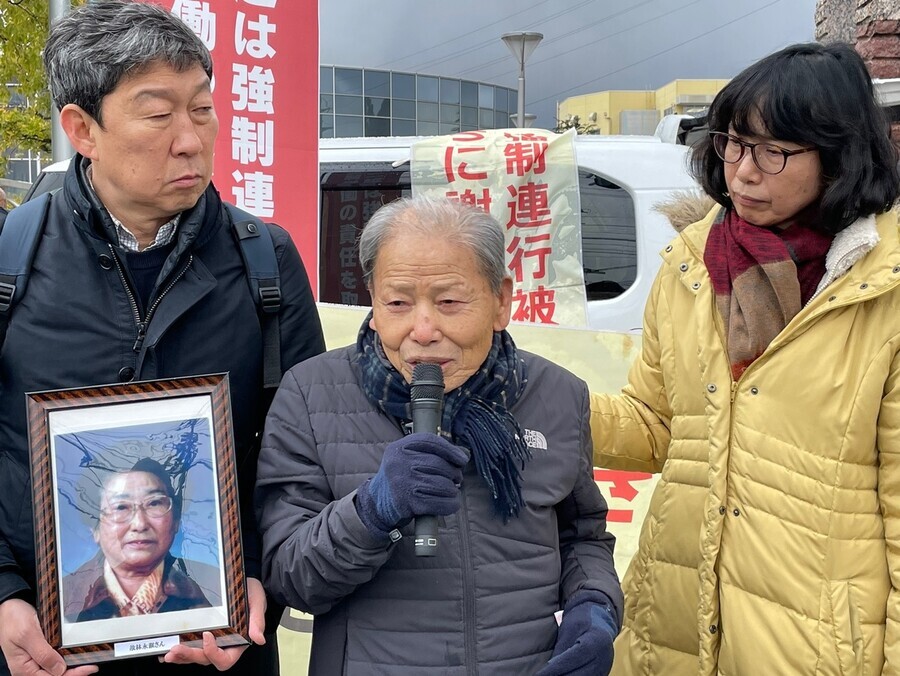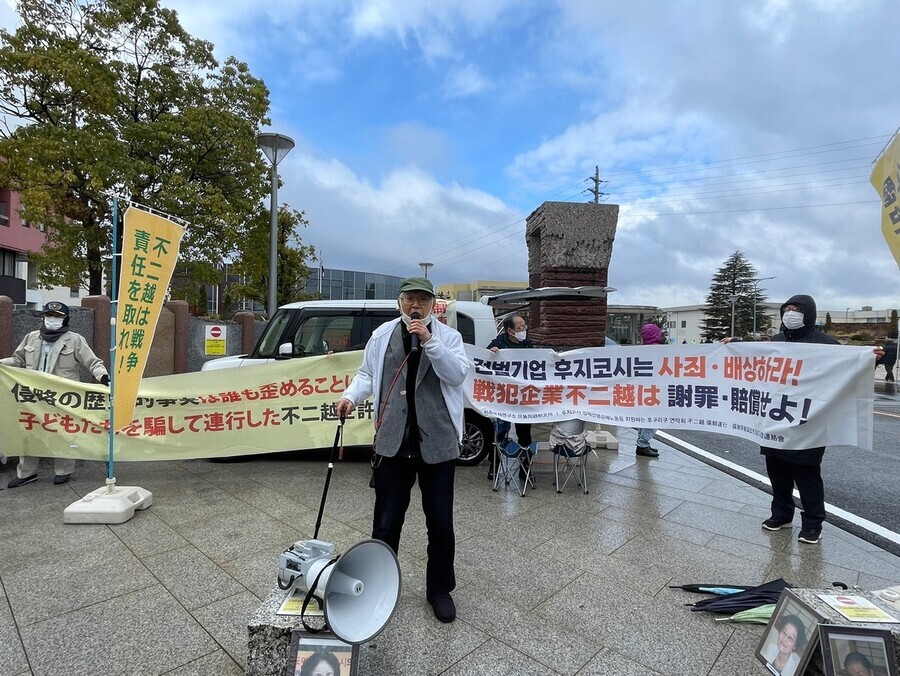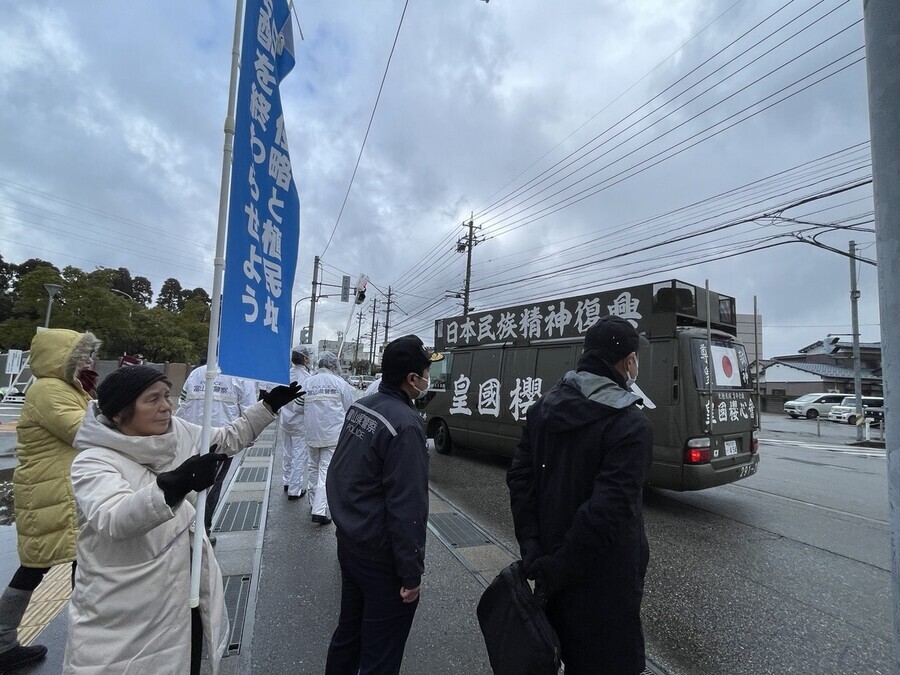hankyoreh
Links to other country sites 다른 나라 사이트 링크
At 93, Korean man faces down Japanese corporation that used his wife for wartime slave labor

“I’m here not to make a request, but to offer a warning. Fujikoshi needs to make an apology and give compensation to the victims of forced labor in accordance with the Supreme Court’s decision,” the old man shouted boldly at Tsutomu Kurosawa, the president of Nachi-Fujikoshi Corp, at 10 am on Tuesday as snow turned to hail.
Kim Myeong-bae, 93, was attending the general meeting of shareholders of Nachi-Fujikoshi Corp, a Japanese conglomerate producing machine parts and other components in the Japanese city of Toyama, in Toyama Prefecture. He had come all the way from his home in Yongin, in Korea’s Gyeonggi Province, with the hope of getting justice for his wife, who was a victim of forced labor during Japan’s colonial occupation of Korea.
“I’m angry that my wife never heard a single word of apology [from Fujikoshi]. In the end, we prevailed at the Supreme Court. Fujikoshi needs to stop hiding behind the Korea-Japan claims agreement [concluded in 1965],” said Kim, as he held a funeral portrait of his wife at the site of the shareholders’ meeting.
In March 1945, Kim’s late wife Lim Yeong-suk was persuaded by her Japanese teacher to sign up for the Korean Women's Volunteer Labor Corps at the age of 12, when she was about to graduate from elementary school. That was how Lim ended up working for Fujikoshi, a munitions manufacturer.
Lim had been drawn by the promise of making decent money in good working conditions, but when she reached Toyama, the situation was very different from what she’d been told. There wasn’t enough to eat, and the workers had to spend eight hours a day filing down iron to make airplane parts. Lim never received a cent for her labors and returned to Korea empty-handed in October 1945, two months after the country’s liberation from Japan.

Lim filed a damages lawsuit at the Toyama District Court against Nachi-Fujikoshi with other victims in 2003, but then passed away unexpectedly in 2004, the next year. The plaintiffs ultimately lost their suit.
Kim then filed another lawsuit in a Korean court in 2013 in place of his deceased wife, and then on Jan. 25, 11 years later, Korea’s Supreme Court ruled in his favor.
A total of 41 plaintiffs have won lawsuits related to forced labor at the Supreme Court. That includes 23 direct victims of forced labor, but only eight of them are currently alive.
“My wife felt so much resentment about her time at Fujikoshi and would often talk about it. How could I just quit when I know the truth?” said Kim, who spent 40 years working as an elementary school teacher.
“I can’t take the money given by the Foundation [for Victims of Forced Mobilization by Imperial Japan]. That’s not what my wife wanted. I’m going to follow her wishes until my dying day.”
The Hokuriku Group, a Japanese nonprofit group that has been funding lawsuits by victims of forced labor at Nachi-Fujikoshi for more than 30 years now, once again stood in solidarity with Kim. Victims of forced labor and Japanese civic groups have been purchasing stock at Japanese companies guilty of war crimes so that they can legitimately protest at shareholders’ meetings.
Kim was one of 13 members of the group who attended the shareholders’ meeting on Tuesday.
“The first lawsuit against Fujikoshi in Japan was filed in 1992. There have been several damages lawsuits for victims of forced labor over the past 32 years, and Fujikoshi ultimately lost [in the Korean Supreme Court]. This issue needs to be proactively resolved both for our future, and to gain the trust of the international community,” said Miyuki Nakagawa, the group’s secretary-general.
Japanese protesters from the Hokuriku Group, as well as visitors from Tokyo and Osaka, chanted slogans such as “Apologize to the victims and compensate them” and “We will prevail” in front of the entrance to Nachi-Fujikoshi at 9 am, before the shareholders’ meeting was set to begin.
In a counterprotest designed to disrupt the Hokuriku Group’s efforts, Japanese right-wing groups brought several vans with loudspeakers blaring messages like “Get out of Japan” and “Everything ended with the claims agreement.”
South Korean President Yoon Suk-yeol is determined that the issue of compensating victims of forced labor, the biggest outstanding dispute between South Korea and Japan, should be resolved through “third-party repayment,” in which the victims are compensated not by the Japanese companies themselves but by the Foundation for Victims of Forced Mobilization by Imperial Japan. But that’s unlikely to resolve the issue.

Despite unilateral concessions by the Yoon administration, Japanese companies have declined to contribute to the foundation, and its funds for compensating victims are running low. The foundation has only received 4 billion won (US$3 million) in donations from POSCO and other Korean companies, but with plaintiffs continuing to prevail in the Korean courts, the total damages are expected to exceed 15 billion won.
In addition, an increasing number of victims are refusing “third-party repayment” and are insisting that the apology and compensation come from Japanese companies. The Yoon administration attempted to sweep that issue under the rug by having courts set aside mandatory deposits with the compensation funds that victims and loved ones refuse to accept from the foundation. But the courts have repeatedly ruled against that plan.
“The Yoon administration’s third-party repayment plan is an attempt to turn back the clock of history and disregard the Korean Supreme Court’s decisions. Treating the victims’ demands as merely a matter of money and coercing them into making unjust choices goes against their human rights,” said Kim Yeong-hwan, the head of external cooperation at the Center for Historical Truth and Justice, who also attended the shareholders’ meeting at Nachi-Fujikoshi.
“The third-party repayment plan has already failed. The victims will never abandon their struggle to set history right and restore their human rights,” he stressed.
By Kim So-youn, Tokyo correspondent
Please direct questions or comments to [english@hani.co.kr]

Editorial・opinion
![[Editorial] Intensifying US-China rivalry means Seoul must address uncertainty with Beijing sooner than later [Editorial] Intensifying US-China rivalry means Seoul must address uncertainty with Beijing sooner than later](https://flexible.img.hani.co.kr/flexible/normal/500/300/imgdb/original/2024/0517/8117159322045222.jpg) [Editorial] Intensifying US-China rivalry means Seoul must address uncertainty with Beijing sooner than later
[Editorial] Intensifying US-China rivalry means Seoul must address uncertainty with Beijing sooner than later![[Column] When ‘fairness’ means hate and violence [Column] When ‘fairness’ means hate and violence](https://flexible.img.hani.co.kr/flexible/normal/500/300/imgdb/original/2024/0516/7417158465908824.jpg) [Column] When ‘fairness’ means hate and violence
[Column] When ‘fairness’ means hate and violence- [Editorial] Yoon must stop abusing authority to shield himself from investigation
- [Column] US troop withdrawal from Korea could be the Acheson Line all over
- [Column] How to win back readers who’ve turned to YouTube for news
- [Column] Welcome to the president’s pity party
- [Editorial] Korea must respond firmly to Japan’s attempt to usurp Line
- [Editorial] Transfers of prosecutors investigating Korea’s first lady send chilling message
- [Column] Will Seoul’s ties with Moscow really recover on their own?
- [Column] Samsung’s ‘lost decade’ and Lee Jae-yong’s mismatched chopsticks
Most viewed articles
- 1[Editorial] Transfers of prosecutors investigating Korea’s first lady send chilling message
- 2[Exclusive] Unearthed memo suggests Gwangju Uprising missing may have been cremated
- 3S. Korea “monitoring developments” after report of secret Chinese police station in Seoul
- 4[Editorial] Intensifying US-China rivalry means Seoul must address uncertainty with Beijing sooner t
- 5[Column] US troop withdrawal from Korea could be the Acheson Line all over
- 6China, Russia put foot down on US moves in Asia, ratchet up solidarity with N. Korea
- 7Xi, Putin ‘oppose acts of military intimidation’ against N. Korea by US in joint statement
- 8[Editorial] South Korean women are mobilizing in unprecedented ways
- 9Korea’s first openly trans athlete hopes to prompt a discussion by competing as herself
- 10300 Korean scholars, legal professionals say Yoon is using prosecutors to clamp down on press